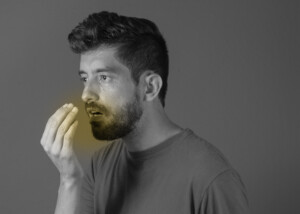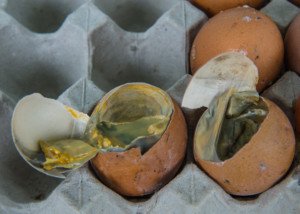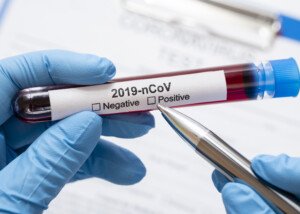
You might think your sense of smell bounced back after COVID-19 — but according to new research, it probably didn’t.
Scientists say many people are walking around with hidden, long-term smell impairments without realizing it.
And that’s more serious than it sounds: a dulled nose can affect safety, mental health and may even signal risks for future neurological problems.
A study led by the National Institutes of Health’s RECOVER initiative found that people who believe their sense of smell changed after having COVID are very likely right.
Using a 40-odor scratch-and-sniff test, researchers discovered that even two years after infection, smell loss remains surprisingly common — and often goes unnoticed.
This is easy to believe because there’s really no reference point for odor detection, in the same way that there is for vision acuity.
We read every day, up close and distant, and what we read doesn’t change in size.
So it’s easy to notice when our vision starts getting duller: Highway signs are now blurry when they weren’t before; we have to be closer to them before we can finally read them; up-close reading now produces slightly blurry words.
But common odors in the environment naturally fluctuate, so it’d be more difficult to tell if your sniffer is compromised.
About the Study
The study involved more than 3,500 adults across the U.S. and was supported by the Clinical Science Core at NYU Langone Health.
Researchers found that 80% of participants who said their sense of smell changed after COVID scored low on the objective smell test.
Nearly a quarter of that group had severe smell loss or couldn’t smell anything at all.
Two-thirds of people who didn’t think they had any smell problems also scored poorly.
Even if you didn’t feel “sick” from COVID-19, your sense of smell could still be affected several years later.
Loss of smell from this virus strain is under-recognized, says Dr. Leora Horwitz, a professor at NYU Grossman School of Medicine.
Interestingly, even 60% of people who never had COVID and didn’t report any smell problems performed poorly on the test.
That suggests many people — pandemic or not — may have a reduced sense of smell and not realize it.
This is akin to having slight hearing loss, even moderate hearing loss, and not realizing it, because there’s no fixed sound (same decibel level, same distance from our ears) that we can use as a reference point – with the exception of always using the same volume setting for the TV and noticing that you’ve been raising it higher lately.
But again, smell impairment is trickier to detect since there’s no setting for “odor volume.”
Hyposmia: A Serious Matter
A dulled sense of smell, known as hyposmia, can have real-life consequences.
It’s been linked to weight loss in non-overweight people, depression and lower quality of life. Food just isn’t as enjoyable without the aroma.
Also, people with hyposmia might not notice a gas leak, smoke or spoiled food. They may not smell their own body odor while others can.
Even more concerning, scientists say that smell dysfunction is sometimes an early warning sign for brain conditions like Parkinson’s and Alzheimer’s disease, since these illnesses often affect the brain’s scent-processing regions first.
This means you don’t have to have a “covid nose” to take smell loss seriously.
What makes this study (JAMA Network Open, 2025) stand out is its size and its objectivity.
Earlier research has relied heavily on self-reports by participants.
This study used an actual clinical scent test to measure the problem more precisely — making it the largest study of its kind to date.
How the Study Was Done
Participants from the NIH RECOVER study — a national project tracking the long-term effects of COVID-19 — completed health surveys every 90 days from 2021 to 2025.
To measure smell ability, they used the University of Pennsylvania Smell Identification Test.
It’s the gold standard for testing smell: Participants scratch and sniff 40 different scents and try to identify them from multiple-choice options.
Each correct answer gets one point, and the final score reveals how strong (or weak) someone’s sense of smell is compared to others of the same age and sex.
Will you ever get your smell sense back?
Now, experts are exploring ways to bring smell back — including vitamin A therapy and olfactory training.
After I had COVID-19, my sense of smell (and taste) was dead in the water.
I employed the olfactory training — daily sniffing of bottles of essential oils: rose, lemon, clove, eucalyptus, mint and orange.
This process helps “retrain” the brain’s response to odors.
For me, it didn’t work. That’s because, as I had theorized, my impaired olfactory sense was caused by inflammation, not nerve damage.
This would explain why some days I could smell and taste, and other days this was very diminished.
After a full workup by an ear, nose and throat physician (otolaryngologist), and a nose specialist (rhinologist), the rhinologist concurred: It’s fluctuating inflammation that narrows the nasal passageways through which odorants travel to reach the olfactory bulb high up in the nose, which then sends signals to the brain where scent is interpreted.
But for so many others, there’s nerve damage, including the olfactory bulb.
When my inflammation is down, my sense of smell is as keen as it’s ever been, allowing me to enjoy my favorite foods.
What about taste? Doesn’t smell dictate taste?
The researchers also note some limitations in the study.
They didn’t directly test for loss of taste, which often goes hand-in-hand with smell issues.
And since not everyone was tested for COVID-19 during the pandemic, it’s possible that some uninfected participants were actually misclassified.
That might explain why even those who supposedly never had the infection showed hyposmia with higher-than-expected rates.
Final Thoughts
You don’t have to completely lose your sense of smell for it to be affected.
COVID-19 may have subtly dulled it — and that could be your body’s quiet way of signaling deeper changes.
Also, one need not have felt sick from this coronavirus strain to have suffered loss of smell and taste.
I never even knew I was infected until I lost my smell and taste. During my infection I was actually killing it at the gym.
Naysayers about this whole COVID thing may insist that it’s “just a cold” and “only affects old or fat people and people with compromised immune systems.”
I’ve heard this way too many times. Yes, these populations were much more likely to die from “the Rona.”
But impairment of smell and taste has been vastly under-rated, under-publicized, and apparently affects many young, healthy people of normal body weight.
A receptionist at a doctor’s office told me she can’t taste anything except peanut butter and maybe one other item; everything else is dead. And soda tastes like battery acid.
This was her status two years post-COVID infection. And she’s of normal body weight, never had a compromised immune system and is in her 20s. Who knows how many more like her are out there.









































